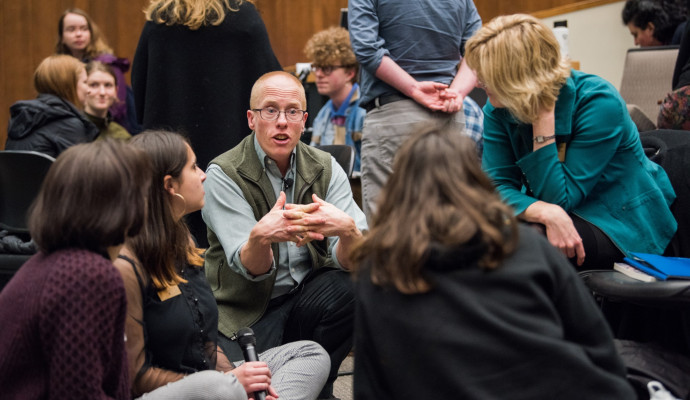Trainings & Workshops

As a trainer and facilitator, Eli creates engaged, interactive space to develop skills, gain knowledge, and build community. The workshops below:
- Have been delivered in many different settings over the last several decades.
- Are suitable for conferences, classes, staff meetings, and community gatherings.
- Can be tailored to various audiences, including grassroot activists, service providers, and university students, staff, and faculty.
- Are designed to range from 1 to 3 hours.
- Eli is happy to discuss other possibilities to meet your needs.
Disability Access, Disability Issues, Disability Culture
Eli offers a range of possibilities–diversity talks, facilitated discussions, and trainings–to educate students, activists, and departments/agencies about disability. These possibilities include:
Moving Beyond Pity & Inspiration: Disability as a Social Justice Issue
- Description: Many people, both on college campuses and in the non-profit world, frequently interact with disabled people but with little awareness of disability as an issue of cultural competency and social justice. Often the major disability issues faced by disabled people are not about health but about disability-based marginalization and discrimination, which in turn impact access to education, employment, housing, and social services.
- Format: Lecture, facilitated discussion, small group work.
- Length: The curriculum can be adjusted for a variety of contexts ranging from a one-hour presentation to a day-long training.
A Politics of Access
- Description: Using foundational concepts from disability politics, this workshop explores how these ideas impact many marginalized groups and asks participants to develop a broad-based politics of access. On campuses, which students are actively recruited, and once enrolled, which students stay? In non-profit and grassroots organizations, who is actively welcome to take part and how; who stays, and who leaves? All of these questions are about access.
- Format: Lecture, facilitated discussion, small group work. Designed specifically for staff, faculty, and administrators.
- Length: 90-120 minutes.
At the Intersection of Queerness and Disability
- Description: What issues do disabled LGBTQ peoples face? What are the connections among ableism, homophobia, and transphobia? How do issues around queer disability identities fit into a broader intersectional social justice framework? Join Eli for a facilitated dialogue about these questions and more.
- Format: Lecture, facilitated discussion, small group work.
- Length: 90-120 minutes.
What Does Disability Identity Have to Do with It?
- Description: This training is designed for staff at disability services offices who work hard to provide accommodations for disabled students. But often in that work, issues around disability identity fall to the wayside. In this workshop, Eli facilitates an exploration of the ways in which fostering disability identities among disabled students helps create more accessible campuses.
- Format: Lecture, facilitated discussion, small group work.
- Length: 2-3 hours.
Anti-Ableist Health Care Provision
- Description: Designed for current health care providers and health care providers in training, this training explores the various ways in which disabled and chronically ill people encounter ableism (disability-based discrimination and lack of access) in medical settings and the impacts of that ableism. Participants leave with action steps to provide anti-ableist care.
- Format: Lecture, facilitated discussion, small group work.
- Length: 2-3 hours.
LGBT Issues and Identities
Eli trains on a variety of LGBT topics, ranging from Transgender 101 to the impacts of homophobia and heterosexism. As staff at the University of Vermont’s Prism Center for five years in the early 2000s, he trained hundreds of people, including RAs in residence halls, campus police, and Student Life staff, on these issues.
Intersectionality
An Intersectionality Primer
- Description: Many of us encounter the idea of intersectionality with some frequency but don’t quite know what it means. This workshop delves into the framework of intersectionality, its Black feminist activist roots, and how it necessarily expands our understandings of social justice and liberation.
- Format: Lecture, facilitated discussion, small group work.
- Length: 90-120 minutes.
Body Politics
Stolen Bodies, Reclaimed Bodies
- Description: Oppression often lodges in our bodies, stealing them away from us in a myriad of ways. What stories do each of us have to tell about this thievery and the ways in which we resist it, working to reclaim our bodies? Using storytelling, images, and journal writing, this workshop explores these questions and issues across various identities, communities, and systems of oppression.
- Format: Facilitated discussion, small group work, journal writing.
- Length: 2-3 hours.
Storytelling
Brilliant Imperfection, Writing About Bodymind Difference
- Description: In this writing and storytelling workshop, we spend time with stories about our brilliantly imperfect bodyminds. What words and images name our brilliance and imperfection? We use frameworks created in disability communities that offer guidance to everyone who lives with bodymind difference.
- Format: Facilitated discussion, small group work, journal writing.
- Length: 90-120 minutes hours.
Living with Extractive Economies (A Storytelling Workshop)
- Description: Eli grew in a fishing and logging town on the coast of Oregon. As a teenager, he worked, hiked, and cut firewood on clearcuts. Those experiences shaped both his love of trees and mountains and his environmental politics. He knows that many people have intensely personal and intimate relationships with extractive economies—logging, commercial fishing, coal mining, monoculture agriculture, factory dairy farming, oil drilling, fracking, and more. This workshop creates space to explore and tell stories about those personal relationships.
- Format: Facilitated discussion, small group work, journal writing.
- Length: 90-120 minutes hours.
Privilege
Digging Deep: Thinking about Privilege
- Description: In many communities as we work for social change, we are fueled by rage and grief, by naming the ways we are marginalized. Stories of oppression are important; they help us shape what we know about discrimination. These are the stories we most often tell, mostly leaving unspoken the ways in which we’re privileged. In short, oppression is easier to claim than privilege. This workshop creates space and a structure to name and reflect upon our privileges, and strategize about how to use them effectively for social justice.
- Format: Facilitated discussion, small group work, journal writing.
- Length: 2-3 hours.
